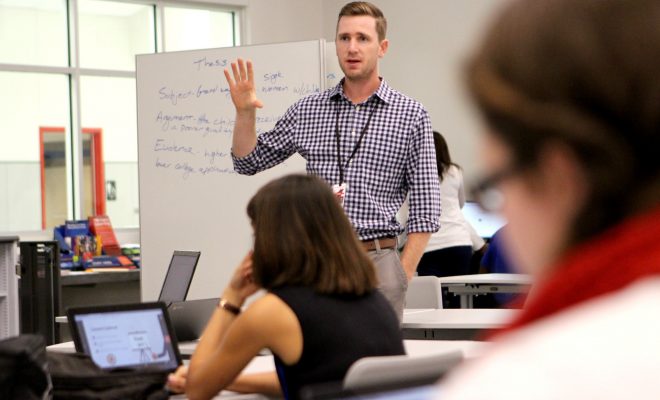School Community Collaboration and Peer Observation as Levers to Student Success

A guest post by Mark D. Benigni, Ed.D., Thomas W. Giard III, and David Levenduski
Meriden Public Schools, Connecticut
We are in an unprecedented era of accountability, a new teacher evaluation and development system, the Common Core State Standards, Smarter Balance Assessments and increased scrutiny from big business, the press and public. Our public schools face decreasing financial resources and additional federal and state mandates. Therefore, creating opportunities for our educators to work together in meaningful ways needs to be a priority for every district. School districts must create systems that encourage our educators to observe, reflect, collaborate, and enhance their instruction.
In Meriden, our deliberate and thoughtful steps to promote peer collaboration at the district and school levels has been a five year journey working with our teachers’ union to design and implement true teacher support programs. Together, union and management are breaking down the barriers that have isolated educators from their colleagues and peers. We first developed a comprehensive approach at the district level to begin having teachers spend time in each others’ classes as a strategy towards instructional improvement. The development and implementation of three distinct programs took shape: our Peer Coaching Program, our Learning Walks Program, and our Meriden Teachers Sharing Success Team.
Peer Coaching Program
Our peer coaching program provides educators with an opportunity to observe other educators in action. The premise of our program is that our best teachers are our best teachers and that educators can help educators improve student learning. The major roles of a peer coach are to collaborate, provide beneficial feedback, share effective teaching strategies, and reflect on teaching and learning. Peer coaches are matched with peers by grade level or content area with someone outside their building. Peer coaches receive training from the National School Reform Faculty and use an established protocol to share honest and open feedback with their peer coach and to guide their reflections regarding what they learn from each other.
The program expectations include peer coaches spending a minimum of one full day in the peer’s classroom. While the minimum is one day in the peer’s classroom, many do more and many have formed lasting professional relationships that continue long after the one year in the formal peer coaching program. Over the last five years, we have sent a clear message to the teachers that this is important work and vital to their own growth as an educator.
Learning Walks Program
Three years ago the district launched a learning walks program in all twelve schools. The learning walks program involves having teams of teachers, with an administrator, observe classroom instruction in their own building using an evidence-based protocol for data collection and debriefing. We collaborated with The Connecticut Center for School Change to develop a model, based on instructional rounds, which could be adapted to the building level and inclusive of teacher teams as opposed to simply teams of administrators. Two teams of four to five teachers visit up to six classrooms for about 15-20 minutes each, using a descriptive evidence data collection strategy. The classroom visitations are centered on a problem of practice or focus area and teachers are there to observe teacher and student actions. Teachers use data collection sheets that ask them to observe within the context of these three questions: What is the teacher saying and doing and to whom? What are the students saying and doing and to whom? What is the content/task? These data-gathering questions are used in a comprehensive debrief process of the classroom observations. Data is shared as common instructional patterns observed, not individual teacher critiques.
Our teachers constantly tell us that the learning walks debrief is an exceptional professional development experience. The debrief is a three-step process. It starts with an individual debrief where the teachers review their classroom evidence in the context of the focus area and select key pieces of evidence from each of the rooms visited. Evidence may only contain what they actually saw occurring in the classroom and cannot include any judgment or assumptions. Teacher names are not used. The second step of the debrief process entails having teachers share their evidence with their team and evidence is organized into patterns by the two respective teams.
The third step in the debrief process is each team reports out to the whole group and evidence is discussed, challenged, and reflected upon by all teachers in attendance. The whole group then answers three questions that will be shared with the faculty at a future meeting. The questions answered by the teachers are: What did your group observe as strengths? What did your group observe as possible areas for growth for our school? What questions/suggestions can you pose that will help our school move instruction related to our focus area to the next level? Are their implications for future professional development? Any teachers observed on a learning walks day become part of the learning walks classroom visitation team next time. This process helps us promote an atmosphere and cycle of continuous improvement in our schools.
Meriden Teachers Sharing Success Team
As Meriden rolled out their new teacher evaluation and development process, a commitment was made to provide educators with additional development and growth opportunities. As a result, union and management created the Meriden Teachers Sharing Success Team (MTSS) to recognize our exemplary educators and to provide support and growth opportunities for teachers. MTSS team members are tenured Meriden Public School teachers who open their classrooms for peer visitations and avail themselves for discussion and reflection with their peers who visit.
At the elementary level, MTSS teachers are educators who have led their students to substantial student growth for four consecutive years. We have MTSS teachers at all grade levels from kindergarten through grade 5. At the secondary level, our major instructional focus has been on creating student-centered learning environments. Secondary MTSS teachers are teachers who are effectively implementing student-centered learning in their classrooms. These teachers are identified by their principals and are vetted by a group consisting of central office administration, teachers’ union leadership, and administrators’ union leadership. All MTSS teachers are trained by the National School Reform Faculty to assist their colleagues in their continual growth process.
Teachers can self-select to go observe an MTSS teacher or it might occur after a conversation with a coach or supervisor about how best to enhance their classroom instruction. Regardless of how a teacher decides to observe an MTSS teacher, all who take advantage of this program have shared that it has improved their instructional practice.
The School-Based Launch
Initial conversations: There are two words that can have a negative impact on educators, and leave any good idea or intention on the cutting room floor: initiative and mandate. In the dynamic world of education, initiatives and mandates are thrown at educators with the speed and fury of a tsunami. Wave after wave of expectations crash in from legislators, state departments, districts and administrators. If these initiatives and mandates are not carefully presented with connections to improvement in practice, they are doomed from the onset.
So the school principal presented the idea in a way that connected the practice to what was being implemented across the district, and explained how staff can improve and learn from each other. Prior to beginning to have teachers observing one another, every opportunity, from faculty meetings to data team meetings to individual conferences, were used to emphasize and highlight the importance of collaboration and sharing of best practices. Beyond data teams, the principal worked in conjunction with the staff to develop an intervention and enrichment system which increased opportunities to collaborate to plan instruction, and allowed teachers to share students and begin to blur the lines regarding who “owned” the students. Their own data was utilized to build confidence and exhibit the instructional strengths that were being cultivated within the school. Staff came to realize that they did not need to always look outside the school for professional development opportunities; the professional expertise was among them. These conversations built the foundation for the next stage; creating the system.
Creating the system: With the foundation laid to enable staff to increase collaboration, peer observations as a supportive tool for strengthening instructional practices was a natural extension of our efforts. The next step was to share the idea of utilizing an observation to connect a teacher who shows a strength in an area to a teacher who exhibits a weakness in that particular area; all based on student achievement data and on the premise of supporting, not evaluating. These conversations were accomplished through the district’s process of goal setting meetings, which occur at the beginning of the year when student-achievement goals are set for the school year. These meetings became the catalyst to connect teachers for observations with an instructional focus in mind.
With building leadership’s support, time was re-engineered to create opportunities within the schedule for the teachers to conduct their observations. A reflection sheet, which the observer used to document the experience and reflect on what they observed and how the observation would impact or influence their future instruction, was developed. Then came the light bulb moment at a state-run professional development workshop regarding adaptations to the data team process during which a new mandate was presented for developing a SMART goal for the teachers. While other districts and schools expressed concern, the staff conferred and decided that instead of adding another mandate or initiative to teachers’ already full plates, the peer observations would be used as the new mandated adult SMART goal.
It was at this point that peer observations became “officially mandated”. This was viewed in a positive light by the staff because it involved the utilization of a practice which had already begun instead of adding yet another initiative or mandate. The system for peer observations was now created and in motion, and the teachers were supportive because they were involved and part of the decision to mandate the practice.
Releasing Responsibility: The overall goal was to begin a practice that would ultimately become a natural part of our professional routine. Through the creation of a schedule in the office where teachers could sign-up for times to observe others, we quickly began releasing responsibility to the teachers. Securing sub coverage at the beginning of the year assured a successful release of responsibility to the teachers. Another change that provided momentum was the adoption of a new district evaluation plan. Like the teacher SMART goal that was originally linked to the peer observations, the new evaluation plan contained a professional practice goal for teachers. This goal required the teacher to collect and present artifacts and evidence which connected to the identified practice the teacher selected. The peer observations and accompanying reflection sheet served as valuable artifacts for this professional practice goal.
Culture of Collaboration: A wonderful transformation began to unfold as the staff progressed; teachers were not only scheduling times for the peer observations, but teachers were also conducting observations on their own during preparation periods. The teachers were now viewing the peer observations as important for improving their instruction, and were using their own time to conduct them. The school was also beginning to see improvements in student achievement, which provided tangible evidence of improvements in practices. The staff was also becoming much more comfortable with the practice of observing each other to improve their own teaching practices. It was not “taboo” for teachers to admit they had areas for growth, and more importantly they realized there were available resources in their own building to assist. In essence, the school was fast-becoming a learning community. As the school was progressing with its own internal observation system, staff saw the connections to the district’s initiatives of MTSS and learning walks, and the value in their own internal peer observation system. The connections between the district initiatives and the school-based observation initiative provided a level of comfort with opening classroom doors that did not exist previously.
Moving Forward: As the journey of sharing best practices through professional collegiality and peer observations continues, the plan will be to have all teachers within a grade level conduct “vertical” observations. This would include visiting and observing instruction of classrooms one grade below and one grade above the grade they teach. This will allow the teachers to understand the rigor of instruction at those grade levels, and how it impacts their own instructional practice at their grade level. Wherever the school proceeds to next with observations, the idea is to build upon the level of trust, support and collaboration that has been established. The “culture of collaboration” has been instrumental in improving the way the staff operates on a day to day basis, and the results seen in student achievement and teacher development have validated the efforts.
As a district, we are moving forward together with a foundation of trust and open-mindedness. We are a collaborative team that has created a unifying vision for our district. We believe that every child is entitled to a high quality education, that teachers and leaders impact every child’s achievement, and that collaboration improves student learning and sustains our mission to see our students make positive progress.
Just this past year, we achieved the highest scores in district history in grade 3 reading, grade 5 science, grade 6 math, grade 7 reading, and grade 8 reading and writing. Our school climate data were equally impressive. Since 2010–2011, suspensions have decreased by 58%, expulsions are down 88%, and school-based arrests have been reduced by 77%. In the Meriden Public Schools, we know that in this era of accountability, our approach has to be more than simple compliance; we have to create a professional learning community where teachers learn from one another. We must create schools where students and staff want to be.
___
Mark D. Benigni, Ed.D. ([email protected]) is Superintendent of Meriden Public Schools and is Co-chair of the Connecticut Association of Urban Schools Superintendents. Dr. Benigni also serves on the American Association of School Administrators (AASA) national Governing Board.
Thomas W. Giard III ([email protected]) is Assistant Superintendent for Personnel and Staff Development of Meriden Public Schools and is an adjunct professor at Sacred Heart University in the Educational Leadership Program.
David P. Levenduski ([email protected]) is Principal at Ben Franklin Elementary School in the Meriden Public Schools and is the architect of Meriden’s school-based peer coaching model.
___
Resources:
City, E.A., Elmore, R.F., Fiarman, S.E., & Teitel, L. (2009). Instructional Rounds in Education. Cambridge, MA: Harvard Education Press.
Govindarajan, V. & Trimble, C. (2010). The Other Side of Innovation: Solving the Execution Challenge. Boston, MA: Harvard Business Review Press.
Kelly, M. (2007). The Dream Manager. New York, NY: Beacon Publishing
Sinek, S. (2009). Start With Why: How Great Leaders Inspire Everyone to Take Action. (2011 ed.). New York, NY: Portfolio/Penguin Group (USA) Inc.
Teitel, L. (2013). School-Based Instructional Rounds: Improving Teaching and Learning Across Classrooms. Cambridge, MA: Harvard Education Press.
Wei, R. C., Darling-Hammond, L., & Adamson, F. (2010). Professional Learning in the United States: Trends
and Challenges. Dallas, TX: National Staff Development Council.
Wong, K., & Nicotera, A. (2006). Successful Schools and Educational Accountability: Concepts and Skills to Meet Leadership Challenges. Boston, MA: Pearson Education.






